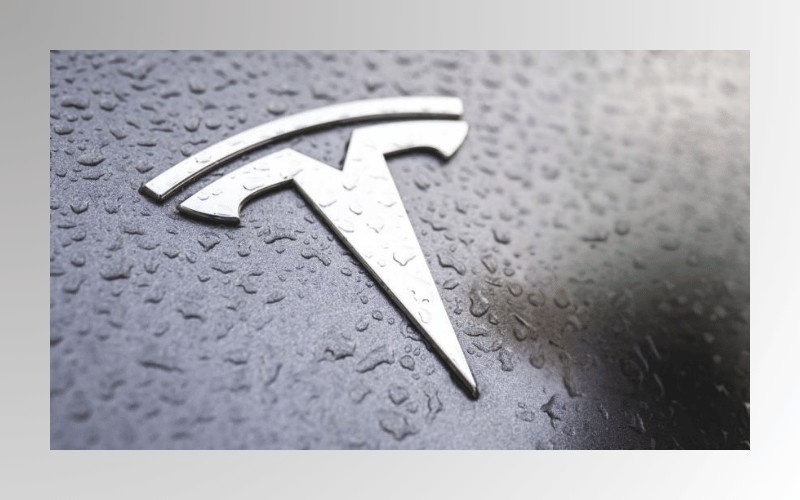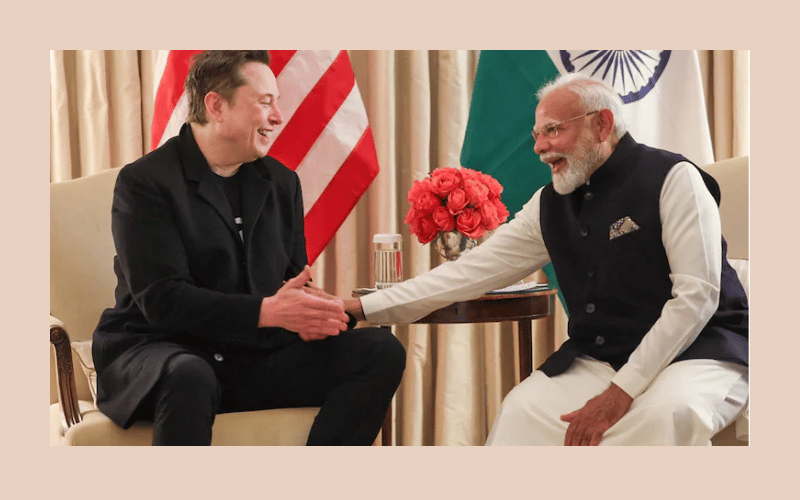The anticipated India visit of Elon Musk generates excitement throughout the country about developing electric vehicle (EV) markets. Social media platforms showed intense activity after Musk confirmed his plan to come to India for visiting purposes likely during 2024. The diplomatic visit marks the start of what could become Tesla’s much-awaited market entry into India’s fast-growing electric vehicle segment. The favorable conditions brought together by policy changes and market requirement and strategic placement indicate Tesla’s Indian entry may start soon.
Elon Musk and India: A Long Courtship
The company Tesla has shown continuous interest in entering the Indian market. The Tesla CEO Elon Musk expressed his intention to introduce Tesla to the Indian market back in 2017. Talks between Tesla and Indian authorities broke down again and again because of price barriers and detailed regulations. The high Indian import taxes prevented Tesla from pursuing market testing because Musk had publicly admitted that they would not make economic sense. Through all the problems, the communication channel between the companies remained active.
India’s New EV Policy: A Game-Changer for Tesla
The transformation of the Indian EV policy serves as the primary motivator that inspired Elon Musk to show renewed interest in the Indian market. The Indian government issued updated EV policy measures in 2024 that provide custom duty benefits to EV companies constructing domestic production facilities. Companies seeking qualifications must make $500 million investments while engaging in local manufacturing operations that should start within three years.
The new policy has been specifically designed to bring global companies such as Tesla into India. Tesla now possesses an economically feasible strategy to explore the Indian market along with building sustained operations through this new government policy. Businesses can now utilize this opportunity to establish domestic manufacturing while showing India’s commitment to pursuing its green mobility targets.
Tesla’s Plans: From Showrooms to Gigafactories
The reports indicate Tesla’s decision to base its first showrooms in both Mumbai and New Delhi. The company is considering the Bandra Kurla Complex in Mumbai, along with Aerocity in Delhi, to establish its first display centers in India. These cities benefit Tesla by providing access to high-end customers and serving as key business and innovation centers for both media and the marketplace.
Tesla holds discussions with the Indian government to establish a production facility that could require an investment ranging from $2–$3 billion. The Indian states Gujarat, together with Maharashtra and Tamil Nadu, are understood to compete for the project. A successful factory establishment in India would enable Tesla to use it as an export base for Asian and Middle Eastern markets, thus positioning India as a vital manufacturing site in its global supply chain network.
Why India Matters to Tesla
The Indian market holds great untapped potential that Tesla desires to exploit. The country has more than 1.4 billion people, along with an increasing middle class, which is rapidly becoming urban, forming a huge potential consumer segment. The Indian EV market continues to evolve, but forecasts show intense growth during the next 10 years, mainly in urban areas that recognize the importance of air quality and carbon emissions.
When Tesla enters the market, it will compete directly with three key domestic EV manufacturers including Tata Motors, Ola Electric, and Mahindra because they are actively developing new products with substantial funding. The market will experience improvement in innovation together with increased safety and broader consumer knowledge as Tesla joins the segment.
Challenges on the Road Ahead
Several obstacles will confront Tesla as the company establishes operations in India despite positive projections. India’s EV infrastructure lacks proper development especially regarding charging stations infrastructure. The EV infrastructure in India struggles to extend beyond major cities which have begun expanding their charging stations throughout Bengaluru and Delhi. For Tesla to replicate its Supercharger network in India the company will need strong local investment combined with governmental policies that support its growth.
Affordability is another issue. The premium character of Tesla vehicles applies to all their models including the Model 3 which offers a more affordable entry point but remains expensive for typical Indian customers. Tesla must plan for creating an Indian model which combines affordability with perfect adaptation to regional driving requirements to achieve success.
To develop a significant market presence Tesla needs to resolve three primary issues including local sourcing strategies together with regulatory approvals and a complete nationwide maintenance service system.

What Tesla’s Entry Means for India
The EV sector will experience a major transformation when Tesla decides to launch in India. The entrance of Tesla into India would bring multiple advantages through its state-of-the-art technology.
The entry of Tesla would attract important support industries that produce batteries and manage semiconductor production facilities.
The entry of Tesla will generate hundreds of thousands of positions across the spectrum from manufacturing to engineering along with R&D.
Clean mobility startups at a local level will get stimulated through Tesla’s entry.
The entrance of Tesla should motivate other worldwide businesses to evaluate India as a significant automotive production facility.
The sustainability dedication of Tesla presents an opportunity for India to achieve its commitments in the Paris Agreement and its National Electric Mobility Mission Plan.
Tesla and India: A Match Made for the Future?
The extensive impact of Tesla’s potential market entry into India requires an examination of all the related systems. The Indian market represents both technological advancement and a demographic potential because it stands as an emerging EV market. Turning 65% of its citizens younger than 35 gives India increased momentum for implementing innovative sustainable technologies and futuristic solutions. Indian consumers from the youth generation and the rising environmental awareness combine to set up excellent prospects for Tesla to enter this market.
Success for Tesla in India will not rely exclusively on its powerful brand recognition. The success of Tesla’s India operation depends on its ability to successfully merge with the economic principles and cultural aspects of the Indian market. The market values of frugality and service reliability, along with local engagement, matter strongly to Indian consumers. The traditional business model of Tesla, which includes high prices and digital sales with minimal service facilities, needs modifications for its Indian market entry.
The rate of car ownership in India stands lower than the levels observed in Western nations. The automotive ownership rate in India during 2022 reached a figure of 22 cars per 1,000 people, while the United States maintained above 800 cars per 1,000 people. However, the trajectory is upward. A projected growth in personal mobility will occur during the following decade because of population income increases and the development of personal aspirations. Tesla stands to achieve major business scale in India through delivering an affordable vehicle designed for local requirements, which delivers both efficiency and compact size.
Localized Innovation: Tesla’s Next Frontier?
The strategic foundation Tesla should implement in India includes establishing a research and development facility to concentrate on developing innovative, budget-friendly solutions. The world respects Indian engineers because they create high-quality solutions that cost less than others, a capability that would enormously help Tesla achieve success throughout its worldwide territories. Research and design efforts on a Model I (I for India) should aim to develop a globally successful product through scalable and affordable design principles.
Tesla Energy the battery storage and solar panel division of Tesla appears unexploited in India given the country’s fast-growing solar market with increasing battery storage demand. Tesla’s energy solutions can create joint ventures with India through renewable goals that will extend from automotive applications into civilian energy systems for residential usage and distribution networks.
Tesla’s Role in India’s Green Goals
As part of its environmental plan India set itself the target to reach net zero emissions by 2070. The transportation sector requires full electrification as a main strategy to reach this goal. The environmental objectives of India strongly support Tesla’s zero-emission vehicles as well as its renewable energy systems.
Indian electric vehicle manufacturers receive financial support through both the Faster Adoption and Manufacturing of Hybrid and Electric Vehicles (FAME) scheme and Production Linked Incentive (PLI) programs. The establishment of local manufacturing facilities would make Tesla both qualified for Indian government benefits and exempt it from previous steep import duties.
The entry of Tesla into India has the potential to expedite the electric vehicle advancement plans of local Indian automakers. The entry of Tesla would spark an innovation competition among local companies who include Tata Motors and Mahindra Electric and MG Motor and this competitive push will advantage consumers along with their suppliers and technical talent.
Conclusion: A New Era or a Familiar Tease?
The visit of Elon Musk to India might shape the history of Tesla’s future operation in the Indian market. The agreement between Tesla and India may either become a successful joint venture or yet another failed business opportunity. This entry into India shows different characteristics from previous attempts. The Indian market stands ready for Tesla’s entry, while the local customer interest runs strong, and the company possesses significant potential through its Indian establishment.
The Indian market appears closer than ever to welcoming Tesla with both showroom locations in Mumbai and factory operations in Gujarat. Indian audiences must now focus on when Tesla will establish operations rather than whether it will enter the market.














